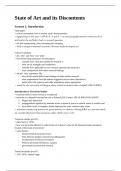State of Art and its Discontents
Lecture 1: Introduction
Final paper:
> critical assessment: how to answer such a broad question
> signposting: in this essay i will do X, Y and Z → in each paragraph mention what you do as
well and at the end link it back to research question
> not just summarising, also evaluating and critiquing.
→ look at antigovernmental terrorism? (because underdeveloped etc)
Critical evaluation
> ask ‘why’ and ‘how’ not ‘what’
> this means being analytical, not descriptive
- consider how valid and reliable the research is
- what are its strengths and weaknesses
- consider how applicable to your research question the research is
- draw comparisons with other research findings
> ask the ‘why’ questions, like
- why do the results differ from findings of other similar research
- what explanations have the authors suggested and are there alternatives
- make links with practice and wider populations where appropriate
→ article by the university of Glasgow about critical evaluation that is helpful? (SEE SLIDES)
Introduction to Terrorism Studies
> terrorism itself is often viewed as exceptional
> terrorism is a disputed concept but can as Schmid (2011) notes: SEE SLIDES FOR QUOTE
1. illegal state repression
2. propagandistic agitation by nonstate actors in times of peace or outside zones of conflict and
3. as an illicit tactic of irregular airfare employed by state- and non-state actors
→ terrorism remains top priority for governments, yet chances of being killed in a terrorist attack
are considerably lower than numerous other ‘dumb ways to die’
Terrorism studies pre-9/11
> dates back to 1970s
> how was terrorism different to other forms of violence? what are the theoretical and conceptual
bounds of the study of terrorism?
> early themes:
- human-based motivations (Gurr)
- links between religion and terrorism (Rapoport)
- revolutionary terrorism (Crenshaw)
- Political terrorism (Wilkinson, Laquer)
- government and terrorism research
Terrorism studies pre-9/11
> 1972-1978: ‘takeoff stage’
, > 1986-1990: stage of decline
- core of 24 terrorism scholars in whole field
> terrorism studies “a static environment, the same hypothesis, definitions and theories to be
analyzed, assimilated, published, cited and eventually retrieved” (Reid & Chen, 2007)
Lecture 2: who is terrorism research for?
International organizations
> UN, NATO, HRW, Amnesty EU, World Bank, etc
> NATO: concerned with terrorism for member states safety
> International Organisation for Migration: migration because of terrorism but also repatriation of
terrorist families
> Human Rights Watch: protection of human rights → privacy, interrogation practices (Abu
Ghraib, Guantanamo Bay, etc)
National governments (domestic)
> home office, ministry of interior, general affairs
> domestic security, law enforcement, and intelligence (AIVD, NCTV, police, MIVD, ministry of
justice, OM)
> ministries of finance, treasury
> immigration and customs
> aviation and transport
> education
> social and welfare services
> health care
> essential industries (power, water, infrastructure, science)
> tourism
National Governments (international)
> foreign affairs, state departments, global affairs
> foreign intelligence
> military
> foreign trade
Specialized institutions which focus on counterterrorism
> global internet forum to counter terrorism (GIFCT)
> tech against terrorism (UN-CTED)
> the global coalition against daesh
> international centre for counterterrorism (the Hague)
> START university of maryland
> international institute for counter-terrorism (Israel)
> international centre for the study of radicalisation (UK)
Private Companies
> Risk Advisory
> Social Media (Facebook, Twitter, Youtube)




